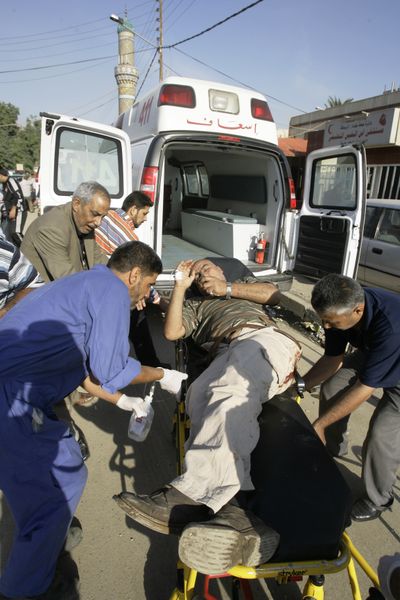Iraq parliament OKs quotas
Agreement guarantees role for minority parties

BAGHDAD – Iraq’s parliament Monday approved quotas guaranteeing minorities a handful of seats on the governing bodies of Iraqi provinces, an action that helps pave the way to regional elections but also angers Christians who had demanded greater representation.
Also Monday, three bombs in Baghdad killed at least seven people, most of them at a busy square targeted by twin blasts that exploded seconds apart during morning rush hour. Another bomb north of the capital killed one person. No date has been set for the provincial vote, but it is due to take place by Jan. 31 and has been heralded as vital to undoing lopsided power structures blamed for perpetuating sectarian violence. The minority quota formula approved by lawmakers would guarantee a total of six seats spread across three provincial councils to Christians and three smaller minority groups: Yazidis, Sabians and Shabaks.
Of 150 lawmakers present, 106 voted for the plan. It sets aside one seat for Christian parties on the provincial councils of Baghdad, Ninevah and Basra. Sabians, a pacifist religious sect, will also receive one seat in Baghdad. Yazidis, from another religious sect, and Shabaks, an ethnic minority, each will have one seat on the Ninevah council.
Like Christians, the other groups have claimed persecution under the Shiite Muslim-led Iraqi government and demanded special protection when parliament in September passed the law setting the stage for provincial elections. That law failed to include special considerations for parties representing minorities, prompting protests by Christian lawmakers and weeks of wrangling to come up with a solution acceptable to small groups and to the Shiite, Kurdish and Sunni Arab parties vying for dominance.
Ninevah, in northern Iraq, is particularly sensitive because of its mixed population largely composed of Sunni Arabs, Kurds, Christians and Yazidis.
Sunni Arabs had resisted setting aside large minority quotas on the 37-seat provincial council, fearful that minority groups might lean toward the Kurds and bolster Kurdish hopes of expanding their influence in the north. A 12-seat option rejected Monday would have set aside seven minority seats on the council.
Hassan Alaf, a Sunni Arab lawmaker, said the minorities will receive the number of seats they deserve based on their population in the region.
Alaf noted that Christian, Yazidi or other minority politicians could increase their voices in Ninevah by running for office under the banner of large political blocs.
The deal must be approved by the nation’s three-member presidency council, and Kana said he would demand a veto. Earlier this year, Kurds succeeded in putting plans for provincial elections on hold when President Jalal Talabani, a member of the presidency, vetoed an election bill that had passed parliament over Kurdish objections. That forced a re-negotiation of the law and led to the version passed in September and tweaked in Monday’s voting.
The worst blasts Monday occurred seconds apart in front of a police building in central Baghdad. Six people were killed, including a 14-year-old boy. Cars, shops and a restaurant were damaged, and the wounded included several police officers.
A roadside bomb in eastern Baghdad targeting an Iraqi police convoy killed one policeman. In Baqouba, the capital of Diyala province north of Baghdad, a car bomb in the parking lot of the provincial council exploded, killing one policeman and wounding 10 people.